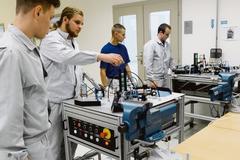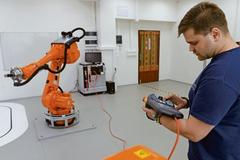Career and HR, page 14
Employment news from Slovakia
Finding work through volunteering
VOLUNTEERING is one way in which the unemployed can find a job. Experts from various countries of the European Union confirmed this at an international conference in Banská Bystrica on September 10.
Experts wanted
ŽILINA-based carmaker Kia Motors Slovakia is having difficultly filling vacancies due to a shortage of suitable and experienced candidates for numerous key positions.
Temporary employment may change
TEMPORARY employment agencies may soon follow a new set of rules aimed at levelling the playing field in terms of working conditions for temporary and permanent employees as of next January. While the Labour Ministry and trade unions say the proposed measures will protect temporary employees, employers and employment agencies say the new rules could do away with temporary employment and eliminate thousands of jobs.
Institutions and organisations in the labour market
Ministry of Labour, Social Affairs and Familywww.employment.gov.skMinister: Ján Richter
Employers slightly optimistic
EMPLOYERS in Slovakia are slightly optimistic about hiring in the last quarter of 2014. A survey conducted by Manpower Slovensko on 751 employers across the country, showed 8 percent of employers expect an increase in employees, while 6 percent anticipate a decrease. As many as 79 percent of the surveyed employers do not expect any changes, with 7 percent of the respondents saying they do not know, the SITA newswire reported.
Firms lack specialists with technical education
DESPITE Slovakia’s two-digit unemployment rate and 380,000 jobless people, companies are having difficulty filling their vacancies, especially those requiring technical expertise. Employers complain of a shortage of specialists with secondary or university-level educations. Both experts and employers see the growing labour market and a poorly tuned education system as behind the current shortage of workers with a technical education, and are calling for changes.“It happens relatively often that we are searching for applicants to fill the most wanted positions even for several months,” said Katarína Bobotová, director of Grafton Recruitment Slovakia. “Sometimes the process lasts more than one year.”
VW opens new courses
VOLKSWAGEN Slovakia is extending its own training facility, the Centre of Dual Education, in Devínska Nová Ves near Bratislava. In the new school year, it has opened two new two-year courses. Thus, along with students attending the two-year mechatronics course, 12 students are starting a course for industrial mechanics and 12 students are enrolling in the course for electro-technicians for automation technologies.
Work-life balance key to motivating workers
SATISFIED employees are more motivated and loyal, which in the end benefits the employer in the form of better results and a better reputation. Much of this can be achieved by providing a work-life balance, which is, simply, enough time for work and enough time for life outside the workplace.
Both under and over- qualification a pr
WHILE an underqualified worker is certainly a problem, being overqualified is a problem, too. Employers fear that an overqualified candidate may lack motivation and loyalty, especially over the long term. Many Slovaks today are overqualified for their jobs, which experts attribute to a mismatch between academia and the labour market, as well as high unemployment. But countries like Japan and Great Britain report an even higher share of overqualified workers.
Slovaks satisfied with their jobs
WHILE more than one half of working Slovaks are satisfied with their jobs, they do not rank among the most satisfied employees in Europe. Those most satisfied with their work are the Swedes, according to Poštová Banka ’s analysis based on data from the Special Eurobarometer 408 survey about the social climate, published in October 2013.
Employment rate edges up
THE EMPLOYMENT rate in Slovakia among people aged 20-64 rose from 63.2 percent in 2002 to 65 percent in 2013, but lagged behind the EU average of 68.3 percent, the SITA newswire reported, citing data from the European Union's Eurostat.
Some HR and employment agencies
-Amrop Slovakia, www.amrop.sk-Grafton Recruitment Slovakia, www.grafton.sk-Index Nosluš, www.indexnoslus.sk-Lugera & Maklér, www.lugera.sk-Manpower Slovensko, www.manpower.sk-McROY Slovakia, www.mcroygroup.com-Menkyna & Partners Management Consulting, www.menkyna.com-ProAct People, www.proactpeople.sk-Profesia, www.profesia.sk-Target Executive Search Slovakia, www.targetexecutivesearch.com-Trenkwalder, www.trenkwalder.sk
More women seeking part-time work
THE SHARE of women in Slovakia wanting to work part time has increased by 3 percentage points to 28 percent in the last five years. This is based on data from the biggest job website in Slovakia, Profesia.sk, the TASR newswire reported in mid May.
Institutions and organisations related to employment in Slovakia
-Ministry of Labour, Social Affairs and Family www.employment.gov.sk-Ministry of Education, Science, Research and Sport www.minedu.sk-Central Office of Labour, Social Affairs and Family (ÚPSVaR), www.upsvar.sk-Central European Labour Studies Institute (CELSI) www.celsi.sk-Employment Institute (IZ), www.iz.sk-Association of Personnel Agencies of Slovakia (APAS), apas.all4net.sk
"IT is in" project is launched
IN VIEW of the high measure of unemployment among young people, the non-profit organisation Aptech Europe, with support from the Accenture company and the job website Profesia.sk, launched a Slovak educational project called “IT v kurze” or “IT is in” in English. Its goal is to increase IT skills among young people and thus help improve their opportunities in the labour market, Aptech Europe wrote in its press release.
Guidance for deciding on a career
AS MANY as 47.7 percent of Slovaks aged 18-35 do not work in the field in which they studied. Even 40 percent of young people admitted that they would choose a different career path if they had the chance to repeat their decision about their chosen profession, according to the Focus polling agency. These findings were behind the launch of the Success Academy project, aimed at helping young Slovaks advance their career, the TASR newswire wrote.
Seeking ways to attract qualified immigrants
DESPITE high unemployment, Slovakia is eager to attract highly qualified foreign workers to help fuel the economy. But luring these knowledgeable workers means Slovakia must compete with numerous other countries in Europe and beyond. An initiative to ease the path of qualified immigrants wanting to work legally in the European Union, called the Blue Card, could help if Slovakia opts to grant more of them.
Teachers get new job website
BECAUSE only 10 HR experts choose teachers and pedagogical workers for thousands of schools, Slovakia’s biggest job website, Profesia.sk, launched the Edujobs.sk project, enabling all kinds of schools enrolled in the schooling network to publish job offers on the website free of charge, the Hospodárske Noviny economic daily wrote.
Labour market is gender segregated
THE SLOVAK labour market is one of the most gender-segregated markets in Europe. Dušan Chrenek, the head of the Representation of the EC in Slovakia, said this at the seminar “Why Women Matter in Business”, organised by the European Commission in the Slovak Republic, the US Embassy to Slovakia and the American Chamber of Commerce in Slovakia (AmCham) in mid May.
Discussion on qualification underway
SLOVAKIA may soon join the club of countries that recognise the qualifications of workers who lack the necessary education in their field but have gained the skills in practice. The National System of Qualifications project aims to define the basic skills and knowledge required for certain professions and to allow people to obtain a certificate confirming their abilities. Definitions of the first 1,000 qualifications should be published next October.
- Ambulance hit by Russian drone goes on display in centre of Bratislava
- 3 free things to do in Bratislava in the next seven days
- Slovakia’s public finances remain in deep trouble
- Slovakia mourns Pope Francis, a shepherd of hope and humility Photo
- Bratislava’s embassy-backed events you don’t want to miss
- “Return not,” the ocean cried. But I returned for her
- The British Film Institute shines a light on Slovak cinema’s boldest chapter Video
- Danish shoemaker to shut Slovak factory, axing 650 jobs in fresh blow to struggling region
- Ambulance hit by Russian drone goes on display in centre of Bratislava
- Bratislava’s embassy-backed events you don’t want to miss
- Slovakia mourns Pope Francis, a shepherd of hope and humility Photo
- Slovakia’s public finances remain in deep trouble
- “Return not,” the ocean cried. But I returned for her
- Danish shoemaker to shut Slovak factory, axing 650 jobs in fresh blow to struggling region
- Slovak Matters: A flirtatious Easter of water and whipping
- The British Film Institute shines a light on Slovak cinema’s boldest chapter Video
- Ambulance hit by Russian drone goes on display in centre of Bratislava
- “Return not,” the ocean cried. But I returned for her
- Bratislava’s embassy-backed events you don’t want to miss
- The British Film Institute shines a light on Slovak cinema’s boldest chapter Video
- 3 free things to do in Bratislava in the next seven days
- Slovakia's latest basketball star is destined for great things in the USA
- When to shop over Easter: Opening hours for supermarkets in Slovakia
- US giant pulls plug on Slovak factory, axing 137 jobs
- “Return not,” the ocean cried. But I returned for her
- Ambulance hit by Russian drone goes on display in centre of Bratislava
- German shoemaker Lowa joins wave of factory closures in Slovakia
- 3 free things to do in Bratislava in the next seven days
- US giant pulls plug on Slovak factory, axing 137 jobs
- When to shop over Easter: Opening hours for supermarkets in Slovakia
- Danish shoemaker to shut Slovak factory, axing 650 jobs in fresh blow to struggling region
- Hundreds of people ousted from Bratislava’s Volkswagen
- What is Pope Francis’s message to the powerful?
- Slovakia mourns Pope Francis, a shepherd of hope and humility Photo
- Confetti, chants and history: Hejková’s dream goodbye after nearly 40 years at the top
- Slovakia’s public finances remain in deep trouble
- Ambulance hit by Russian drone goes on display in centre of Bratislava
- Why this gorge deserves a spot on your bucket list Photo
- The British Film Institute shines a light on Slovak cinema’s boldest chapter Video
- Bratislava’s embassy-backed events you don’t want to miss More articles ›








